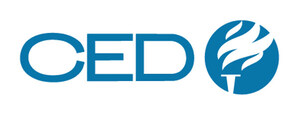News provided by
Committee for Economic Development of The Conference Board (CED)Oct 04, 2024, 13:09 ET
NEW YORK, Oct. 4, 2024 /PRNewswire/ -- Today, the Committee for Economic Development (CED), the public policy center of The Conference Board, issued a letter to the presidential campaigns of Vice President Kamala Harris and former President Donald Trump. The letter sounds the alarm bells on the nation's proliferating national debt—and calls on both candidates to produce credible, detailed plans to avert the nation's debt crisis.
To this point, neither candidate has discussed a plan for reining in the national debt—which now clocks in at $36 trillion. The letter comes against the backdrop of a nation at a fiscal tipping point—a moment of unprecedented economic peril which threatens both the government's ability to pay for policy priorities and long-term prosperity generally. It is signed by CED President David K. Young, and the Co-Chairs of CED's Fiscal Health Committee, David L. Finkelstein of Annaly Capital Management and Joseph E. Kasputys of Economic Ventures.
As the letter reveals, the numbers are daunting:
- $36 trillion: The amount of outstanding public debt the US has amassed.
- $892 billion: The cost of servicing that debt through interest payments, which is set to eclipse this year's non-mandatory defense spending ($886 billion).
- 109%: Public debt as a share of GDP is going to reach a record 109% in 2028—and then keep rising, up to 122% by the end of 2034.
CED offers three key recommendations for achieving fiscal stability and promoting a more resilient, sustainable economy which provides equal opportunity for all Americans:
- Each Presidential candidate needs to propose a comprehensive policy to address our debt crisis and set the Nation on an improved fiscal path. We urge each candidate to commit to working with Congress to address these structural issues after the election, particularly as the current debt ceiling expires on January 2, 2025, just prior to the Inauguration.
- A national strategic goal should be to reduce the US debt-to-GDP ratio from its currently high level of 99% to a more sustainable 70%. In this regard, a Bipartisan Congressional Committee on Fiscal Responsibility should be established to address this challenge. 87% of CED Trustee CEOs and board directors polled said a commission on fiscal responsibility could help reduce the national debt. The Commission should consider the biggest drivers of deficits and the long-term debt: Medicare and Social Security, whose Trust Funds are becoming insolvent. While this is politically difficult, the costs of inaction—including potential cuts for beneficiaries—are far greater.
- The Commission should also undertake tax reform, based on the principles of fairness, efficiency, and simplicity. The pending expiration of many important provisions of the Tax Cuts and Jobs Act offers a unique opportunity for consideration of comprehensive tax reform.
Read the full letter here.
About The Conference Board
The Conference Board is the member-driven think tank that delivers Trusted Insights for What's Ahead.™ Founded in 1916, we are a non-partisan, not-for-profit entity holding 501(c)(3) tax-exempt status in the United States. ConferenceBoard.org
The Committee for Economic Development (CED) is the public policy center of The Conference Board. The nonprofit, nonpartisan, business-led organization delivers well-researched analysis and reasoned solutions in the nation's interest. CED Trustees are chief executive officers and key executives of leading US companies who bring their unique experience to address today's pressing policy issues. Collectively, they represent 30+ industries and over 4 million employees. ConferenceBoard.org/us/Committee-Economic-Development
SOURCE Committee for Economic Development of The Conference Board (CED)

WANT YOUR COMPANY'S NEWS FEATURED ON PRNEWSWIRE.COM?
Newsrooms &
Influencers
Digital Media
Outlets
Journalists
Opted In





Share this article